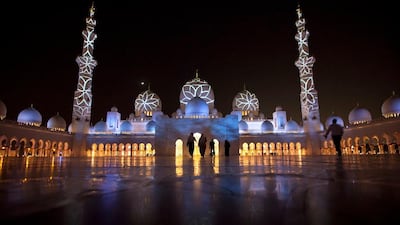Worshippers in Abu Dhabi will commemorate Israa wal Miraj, one of the holiest days in the Islamic calendar, tomorrow when Maghreb prayers at the Sheikh Zayed Grand Mosque come to a close.
It marks the occasion when five daily prayers were commanded for all Muslims by God during the Prophet's ascent to heaven.
"It is considered one of the miracles that God bestowed upon his Prophet," said Radia Salem, a religious adviser at the General Authority for Islamic Affairs and Endowments (GEA).
"Isra and Miraj was the night that prayer was commanded for all Muslims. This happened in heaven, whereas all the other pillars of Islam [such as fasting and pilgrimage] were commanded on Earth."
Many Muslims will observe the event with prayers at mosques or at home late into the night, and some will fast.
Last Friday's Government-issued sermon reminded worshippers of the meaning of Israa wal Miraj, which took place at a difficult time in the Prophet's life. He had just lost his first - and at the time only - wife, Khadija, as well as his uncle, who had adopted and raised the Prophet from a young age.
At the same time, the Prophet's tribe, the Quraish, continued to alienate him as he was trying to spread the word about Islam. He sought refuge in Taef, a town in the western region of today's Saudi Arabia, where he thought some people might believe in his message. However, he was also shunned there.
"The way to Taef was very tough with sharp rocks," said the imam at Mariam bint Sultan Mosque, as he delivered the sermon to a primarily English-speaking audience.
"The Prophet's feet were bleeding and he was suffering a great deal. But the people of Taef pushed him back.
"The Prophet sought God's help, so He helped him. He prayed to God, so God answered. He asked God, so God gave him ... and so came God's hospitality in the journey of Isra and Miraj, which by many scholarly accounts took place during this month as a reward for the Prophet's patience and perseverance."
Every week, the GEA issues a sermon about a topic and expects mosques to preach it. Imams may customise the sermon to suit their congregations.
According to tradition, in one night, the Prophet travelled from Mecca to the Dome of the Rock in Jerusalem, and from there ascended to heaven before returning to Mecca. During his journey, vivid visions of heaven and hell were revealed to him in accounts that some scholars believe later influenced Dante's Inferno.
"Isra and Miraj was a gift to the Prophet after his suffering," the imam said.
The fruit of this gift is the five daily prayers. According to tradition, God initially commanded the Prophet to tell his followers to pray 50 times every day. But on his way back to Earth, the Prophet met Moses, who advised him to ask God for a reduction in the number of prayers to make worship more realistic for Muslims.
Also significant about the journey was the image of the Prophet in heaven being offered three goblets: one filled with wine, another with milk and one with honey.
In one hadith, the Prophet said: "So I chose the one with milk, and I drank it. Then I was told: 'You have chosen the Fitra for yourself and your followers.'"
Fitra, which means natural disposition or instinct, is an important concept in the Islamic tradition and devout Muslims believe babies are born with the Fitra to choose good over evil, to have faith in one God and to submit to Him, which is the definition of Islam.
Whatever religion a person follows is the product of their upbringing. When people convert to Islam, devout Muslims say that person has "reverted to Islam", or has returned to his or her original state, the Fitra.
newsdesk@thenational.ae

Tomorrow marks Israa wal Miraj
Worshippers in Abu Dhabi will commemorate Israa wal Miraj, one of the holiest days in the Islamic calendar, tomorrow.
Most popular today
